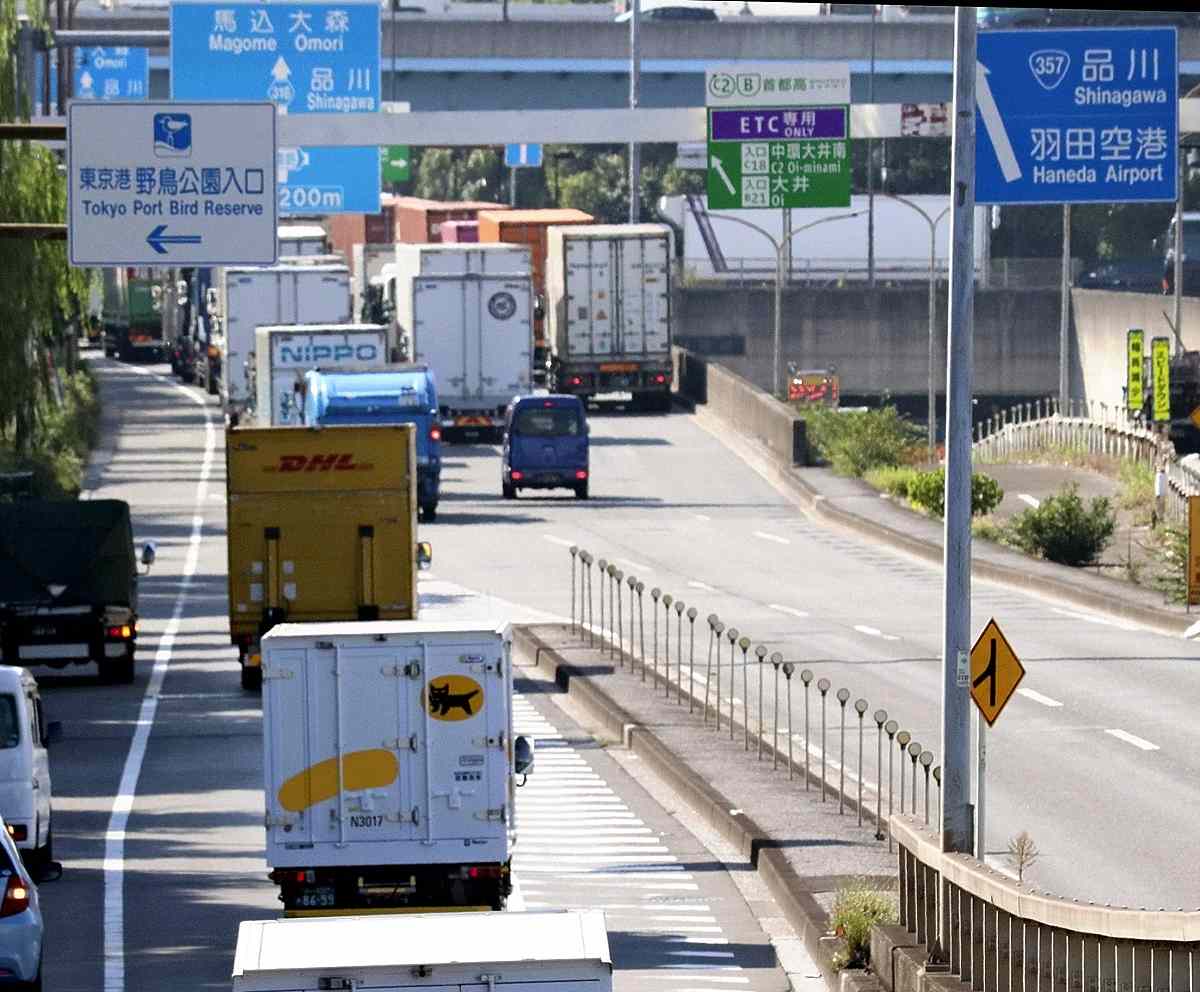Japan Logistics Industry Struggles Amid Shortage of Drivers; Increasing Number of Transport Companies Going Bankrupt

Trucks drive in Ota Ward, Tokyo. on Oct. 2.
1:00 JST, October 7, 2024
Six months have passed since the introduction in April of new overtime restrictions for truck drivers. Despite much concern about the “2024 problem,” which refers to the serious shortage of truck drivers in the logistics industry, there have been few notable cases in which goods could not be transported.
However, maintaining logistics networks continues to be difficult. Small- and middle-sized companies are increasingly struggling to secure enough drivers, and cargo owners are being affected by a surge in labor costs. A growing number of transport companies have gone bankrupt due to driver shortages.
Active headhunting
“We’re facing a serious shortage of workers as fewer and fewer people want to become truck drivers,” sighed Atsushi Setoguchi, the president of Hokushow Corporation Inc. Based in Kita Ward, Tokyo, the company delivers such items as goods purchased from online grocery stores and home appliances. It operates about 150 trucks a day on weekdays.
Now, however, Hokushow has to comply with the new overtime restrictions, even amid the strong demand for deliveries this summer. Many consumers stocked up on food and daily necessities for such reasons as oncoming typhoons and the scarcity of rice.
At the same time, more and more truck drivers are being headhunted by other logistics companies because of labor shortages, so Hokushow is having a hard time securing enough staff. Aiming to offer their employees better terms, the company is negotiating with cargo owners to increase freight charges.
However, cargo owners are also in a tough position.
According to an agricultural cooperative in Nagano Prefecture, their negotiations over rates with a company that transports agricultural products are running into problems in some regions. According to the cooperative, the freight charges change several percent every year, but this year the transport company demanded a 40% increase.
“We understand the hard situation faced by the transport company, but we also hope they’ll understand the producers’ situation. It’s hard for us to pass the cost increase on to our customers,” an official at the cooperative said.
A fishermen’s cooperative in Hokkaido said the departure time had changed for trucks that transport marine products landed at a port. “The change made it impossible for us to ship some fish fresh, including Pacific saury. So, we have no choice but to freeze those fish, which reduces their price,” an official at the fishermen’s cooperative said.
However, there does not seem to have been serious disruptions in the transport of goods nationwide. “We haven’t heard about particular turmoil in the logistics industry,” Land, Infrastructure, Transport and Tourism Minister Tetsuo Saito said at a press conference in September,
This is believed to be partly due to joint transportation efforts among companies, as well as shifts to ship and rail transport.
Overtime used up
An upper limit of 960 hours per year was imposed on truck drivers’ overtime in April, but some drivers had already worked many hours of overtime to transport cargo.
“We’re worried about having used up the permitted overtime hours,” an official related to the logistics industry said. There are concerns about potential driver shortages around the end of the year.
Given this situation, the transport ministry has launched a survey concerning the working hours of truck drivers.
According to an estimate by Nomura Research Institute, Ltd., the volume of all domestic cargo that can be delivered will decline by 35% in 2030 from 2015. The transport ministry aims to construct dedicated lanes for self-driving cargo vehicles using highway median strips and other places.
However, these efforts will take a long time to bear fruit, and labor shortages in the logistics industry are expected to continue for a while.
39% go under
A growing number of logistics companies are going under. According to Teikoku Databank Ltd., 186 road transport companies went bankrupt from January to June this year, up 39.8% from the same period in 2023. This is the second largest figure since the first half of 2009, when 218 companies went bankrupt due to the impact of the Lehman Brothers collapse.
A surge in fuel prices and labor shortages are two of the main factors behind companies shutting down. In addition to higher prices for light oil used for transportation, truck drivers are in short supply due to the limits on overtime. To deal with the cost increase and raise wages to secure sufficient workers, logistics companies have to increase freight charges.
Top Articles in Business
-

Prudential Life Insurance Plans to Fully Compensate for Damages Caused by Fraudulent Actions Without Waiting for Third-Party Committee Review
-

Narita Airport, Startup in Japan Demonstrate Machine to Compress Clothes for Tourists to Prevent People from Abandoning Suitcases
-

Japan, U.S. Name 3 Inaugural Investment Projects; Reached Agreement After Considerable Difficulty
-

Toyota Motor Group Firm to Sell Clean Energy Greenhouses for Strawberries
-

SoftBank Launches AI Service for Call Centers That Converts Harsh Customer Voices into Softer Voices
JN ACCESS RANKING
-

Japan PM Takaichi’s Cabinet Resigns en Masse
-

Japan Institute to Use Domestic Commercial Optical Lattice Clock to Set Japan Standard Time
-

Israeli Ambassador to Japan Speaks about Japan’s Role in the Reconstruction of Gaza
-

Man Infected with Measles Reportedly Dined at Restaurant in Tokyo Station
-

Videos Plagiarized, Reposted with False Subtitles Claiming ‘Ryukyu Belongs to China’; Anti-China False Information Also Posted in Japan





















